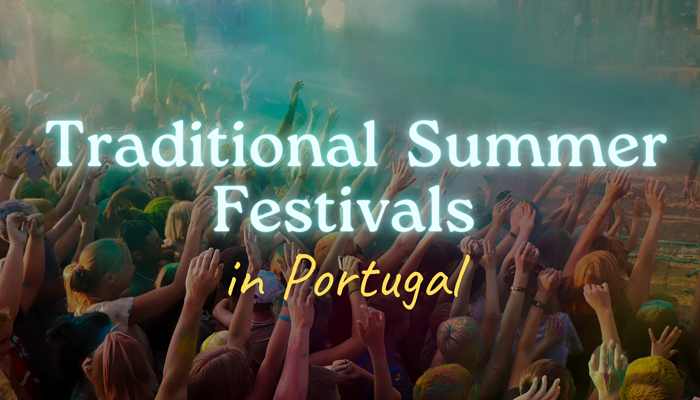Portugal celebrates a variety of traditional festivals throughout the year, each with its own unique customs, rituals, and cultural significance. Here is a list and description of some of the most notable traditional festivals in Portugal that are celebrates during the summer months.
Where is the Portuguese grammar here? Phrases in Portuguese on the same topic are inserted into the text of the article. Even if you level is not yet very high, you can guess it from the context, and if you want to test yourself, you will find translation in brackets.
Festas de Lisboa
It is a month-long celebration that takes place every June in the Portuguese capital city. The Festas de Lisboa are a true reflection of the city’s spirit, uniting both locals and visitors in a joyful celebration.
- One of the highlights is the Santo António procession (Saint Anthony of Padua) that takes place on the 13th of June.
- Santo António é o padroeiro de Lisboa. (Santo António is the patron saint of Lisbon.)
The procession features a statue of Santo António that is carried through the streets, accompanied by traditional music, dancing, and the scent of basil, which is associated with the saint.
One popular tradition is the Arraial Popular, which are street parties held throughout the city. These parties bring together people from different neighborhoods to celebrate with live music, dance performances, traditional food and drinks, and outdoor decorations.
- O Arraial Popular simboliza o sentido de comunidade e convívio. (The Arraial Popular symbolizes the sense of community and conviviality.)
Another cherished tradition is the marriages of Santo António. This unique event symbolizes the union of couples in matrimony and takes place in a festive atmosphere. The weddings are celebrated in the streets, with couples dressed in traditional attire and being officially married by civil authorities or religious officiants.
- A comida e a gastronomia tradicional ocupam o centro das atenções. (Food and traditional gastronomy takes center stage.)
- O cheiro da sardinha assada enche o ar. (The scent of sardines being grilled fills the air.)
- A sardinha é um símbolo icónico das festividades. (The sardine is an iconic symbol of the festivities.)
Grilled sardines are a popular and traditional food during this time, and numerous food stalls and restaurants offer this local delicacy. Other traditional dishes, such as caldo verde (green soup) and caracóis (snails), can also be found during the Festas de Lisboa.
Festa de São João (Feast of St. John the Baptist)
It is a lively and exuberant celebration that takes place annually on the night of June 23rd in several cities across Portugal.
São João Batista é considerado o padroeiro do Porto. (Saint John the Baptist is considered the patron saint of Porto.)
Its festivities are characterized by joyous street parties, animated music, and vibrant processions. People gather in the streets, adorned with garlic flowers and colorful balloons, to join in the merriment. One of the most iconic features of the celebration is the tradition of hitting each other’s heads gently with plastic hammers or leeks.
- Diz-se que esse gesto lúdico traz boa sorte e afasta os maus espíritos. (This playful gesture is said to bring good luck and ward off evil spirits.)
Fireworks light up the nighttime sky, bonfires are also commonly seen, symbolizing the summer solstice and the purification of body and soul.
Festa de São Tiago (Feast of Saint James)
It is a traditional festival celebrated in various parts of Portugal, particularly in Santiago do Cacém, a town located in the Alentejo region. This event takes place on July 25th and honors Saint James the Greater, one of the twelve apostles of Jesus Christ.
The highlight of the festival is the procession of the image of Saint James, carried through the streets of Santiago do Cacém with great devotion and fanfare.
Os participantes vestem fatos tradicionais e a procissão é acompanhada por música tradicional. (Participants wear traditional costumes, and the procession is accompanied by traditional music.)
The festival also features street markets, where local artisans and vendors showcase their crafts, regional products, and traditional culinary delights. Visitors have the opportunity to sample traditional Alentejo cuisine, such as migas (a dish made with breadcrumbs and pork), açorda (a flavorful bread soup), and regional wines.
Festa dos Tabuleiros (Festival of the Trays)
É comemorado de quatro em quatro anos na cidade de Tomar, geralmente no mês de julho. (It is celebrated every four years in the town of Tomar, usually in the month of July.)
The highlight of the festival is a grand procession in which local women, known as “mais velhas” (the oldest), carry large trays adorned with bread and flowers on their heads. These trays symbolize abundance and are a tribute to the Holy Spirit. The procession winds its way through the streets of Tomar, creating a striking visual spectacle.
This event is a glorious display of faith, beauty, and tradition that has captivated both locals and tourists. It underscores the importance of collective celebration and demonstrates the enduring power of cultural festivals to connect people and preserve cherished customs.
Romaria de Nossa Senhora da Agonia
It is a traditional religious festival that takes place annually in the city of Viana do Castelo around the 20th of August.
The festival pays homage to Nossa Senhora da Agonia (Our Lady of Sorrows), the patron saint of Viana do Castelo.
The festival features the Desfile da Mordomia, a parade showcasing the elaborate costumes and jewelry worn by the “mordomos,” individuals chosen each year to organize and finance the festival. These costumes are meticulously crafted and passed down through generations, reflecting the pride and dedication of the Vianense community.
Conclusion
Muitas celebrações tradicionais em Portugal têm profundas raízes históricas. (Many traditional celebrations in Portugal have deep historical roots.)
They commemorate historical events, religious figures, or significant moments in the nation’s history. They serve as a reminder of the past and help to transmit historical knowledge and stories to future generations.
Traditional celebrations attract both domestic and international visitors, contributing to the cultural tourism sector. They showcase Portugal’s vibrant traditions and customs, providing unique and authentic experiences that can help boost local economies.

